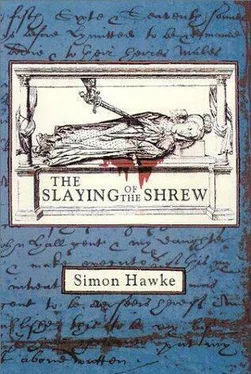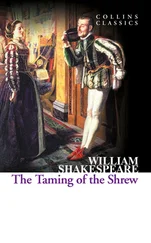Simon Hawke - The Slaying Of The Shrew
Здесь есть возможность читать онлайн «Simon Hawke - The Slaying Of The Shrew» весь текст электронной книги совершенно бесплатно (целиком полную версию без сокращений). В некоторых случаях можно слушать аудио, скачать через торрент в формате fb2 и присутствует краткое содержание. Жанр: Исторический детектив, на английском языке. Описание произведения, (предисловие) а так же отзывы посетителей доступны на портале библиотеки ЛибКат.
- Название:The Slaying Of The Shrew
- Автор:
- Жанр:
- Год:неизвестен
- ISBN:нет данных
- Рейтинг книги:5 / 5. Голосов: 1
-
Избранное:Добавить в избранное
- Отзывы:
-
Ваша оценка:
- 100
- 1
- 2
- 3
- 4
- 5
The Slaying Of The Shrew: краткое содержание, описание и аннотация
Предлагаем к чтению аннотацию, описание, краткое содержание или предисловие (зависит от того, что написал сам автор книги «The Slaying Of The Shrew»). Если вы не нашли необходимую информацию о книге — напишите в комментариях, мы постараемся отыскать её.
The Slaying Of The Shrew — читать онлайн бесплатно полную книгу (весь текст) целиком
Ниже представлен текст книги, разбитый по страницам. Система сохранения места последней прочитанной страницы, позволяет с удобством читать онлайн бесплатно книгу «The Slaying Of The Shrew», без необходимости каждый раз заново искать на чём Вы остановились. Поставьте закладку, и сможете в любой момент перейти на страницу, на которой закончили чтение.
Интервал:
Закладка:
Simon Hawke
The Slaying Of The Shrew
For
Brian Thomsen
With friendship, gratitude, and respect
1
The plague season was good time to be out of London, especially since it often meant the closing of the playhouses. And although Smythe much preferred the excitement of the city and working at James Burbage’s Theatre to the quiet, uneventful country life he’d left behind, carts passing by outside one’s window loaded with stinking corpses rotting in the summer heat had a way of mitigating London ’s worldly charms. Nevertheless, when he found out that the Queen’s Men were going on the road, he was much less concerned about the plague than the possibility that he might not be asked to come along.
He was not, after all, a shareholder in the company or even one of the key supporting players. The boy apprentices who played the female parts were of much more value to the Queen’s Men than he was as a mere ostler who only played occasional small roles and helped out with odd jobs around the playhouse. He had no stake in the profits of the company, other than wishing they’d do well, and to date, the only roles that he had played were small and insignificant, mere walk-ons of the sort given to ordinary hired men such as himself. Even those, as undemanding as they were, he knew he’d botched, for the most part. If not for his friend, Will Shakespeare, whom the company had learned to value for his versatility, he was convinced they would have let him go by now.
“Nonsense,” Shakespeare said, when Smythe confided his worries to his roommate. “There’s always a place in the theatre for a handsome lad with a good leg, a stout chest, and a fine, strong pair of shoulders.” He spoke without putting down his pen or looking up from his small writing desk, which was pushed up against a bare wall opposite their bed in their lodgings at The Toad and Badger, in St. Helen’s parish.
Smythe frowned. The poet’s wit often had a biting edge and he could wield it as adroitly as a cutpurse used his bodkin. He was not sure if the remark was meant to chide him. “And just what do you mean by that, pray tell?”
The irritation in his tone caused Shakespeare to look up from his work and sigh, then glance back at him over his shoulder. His large, unusually expressive dark eyes, the poet’s dominant feature in a somewhat sallow face that was otherwise not especially remarkable, held a look of exasperated resignation. “I mean, Tuck, that there are other attributes to be valued in a player aside from his ability to act. And ‘tis indeed a fortunate thing for you, my friend, for of a certainty, you are no great threat to Ned Alleyn and our colleagues at the Rose.”
The company was still smarting from the defection of Edward Alleyn, formerly their featured player, to the Lord Admiral’s Men, who played at the Rose Theatre. Together with the recent death of the long-ailing Dick Tarleton, whose comedic talents had been a large factor in their company’s success, Alleyn’s departure had been a severe blow to the Queen’s Men. They still had their enviable name, for there could be no more august patron than Her Royal Majesty, but their fortunes had, of late, been on the decline. Smythe knew that the frustration of seeing a rival company’s star in the ascendant while theirs was on the wane was in part responsible for his friend’s sarcastic remark. But he also knew the larger fault was his own, not only for interrupting Will while he was trying to work, but for putting him in the awkward position of standing up for an inferior actor simply because that actor happened to be his roommate and his friend.
“Well, I deserved that, I suppose,” Smythe said, glumly.
Shakespeare sighed again and put down his pen. He pulled off his ink-stained, calfskin writing glove, which had no mate for he had made it for himself for this specific purpose, dropped it on the table and then turned around to face him. “Right then,” he said, placing his hands upon his knees and regarding him with a steady, direct gaze. “Let’s have it. Out with it.”
“Out with what?” asked Smythe.
“Whatever matter stalks the labyrinthine mazes of your mind like some perturbed spirit,” Shakespeare replied, dryly. “Give vent to it, for ‘tis clear that I shall have no peace til you have unburdened yourself.”
“Nay, Will, I have distracted you enough already with my own concerns. You must return to yours and work upon your sonnets, for ‘tis that work which pays our rent.”
“You contribute your fair share,” Shakespeare responded. “And in truth, ‘tis not as if this sort of work requires great labor, though it does seem laborious, betimes. A poet who sings the praises of some aristocratic popinjay for a few pounds is little better than a trollop who kneels for a few shillings. Yet if fortune must condemn me as a dishonest sonneteer, at least I am an honest strumpet in giving forth to the best of my ability. But now we stray. Of late, my friend, you have been ruled by a most bilious humor. Ever since you learned that the Queen’s Men were going on the road, you have been sulking like an errant schoolboy sent indoors to learn his hornbook. This sullen truculence of yours is most unseemly. What ails you, Tuck?”
“I have already given you the cause of my distemper.”
“And I have sought to reassure you. Never fear, Tuck, you are coming with us, that I’ll warrant. With Ned Alleyn and Dick Tarleton both departed, one for a more prosperous venue and the other, presumably, for a more virtuous one, the Queen’s Men need all the help that they can muster.”
“But, Will, I can scarce replace either Dick Tarleton or Ned Alleyn,” Smythe replied. “I can neither clown or dance a jig, nor, in truth, can I act with any great ability.”
“Well, in truth, you cannot act with any ability at all,” said Shakespeare. “As for clowns and jig dancers, they have had their day. The groundlings may still find some amusement in the brainless caperings of that oaf Kemp and his ilk, but it shall not be long ere that sort of thing begins to pall upon them. One can only see so many clownish jigs and pratfalls before the novelty wears off. On the other hand, people never seem to tire of comely lads and lasses, and you, young Symington Smythe, are a fine, handsome figure of a man whom lads and lasses both find comely. What is more, you not only have a way with horses as befits a proper ostler to the gentry and nobility, but are a skilled farrier and smith to boot, and have the strength of a bull, qualities always of great value to any company of players on the road.”
“So then, you hold that my only attributes are my strong body and good looks?” asked Smythe.
“Well, for my own part, I find many qualities in you to value as a friend, but so far as the company may be concerned, it does help to have some attractive people on the stage. And aside from one or two apprentices who have the comeliness of youth, the Queen’s Men, sad to say, are not a very comely lot.”
Though he knew that Will meant well, Smythe did not find the poet’s words encouraging. Ever since he had seen his first play put on in the courtyard of a village inn by a traveling company of players, the very Queen’s Men who now played at the theatre where he was employed, he had nursed a childhood dream of becoming a player himself, but unfortunately, his father had not supported him in that ambition.
A man with considerable ambitions of his own, Symington Smythe the elder had been scandalized at the notion that the son who bore his name wanted to become something as disreputable and low class as a player. He had secured his own status as a gentleman with great expense and much currying of favor and had his eyes set upon a knighthood. Having his only son wishing to become a player was simply unacceptable. Instead, in the belief that some hard work would knock some sense into his head and at least teach him a decent and respectable trade, he had him apprenticed to a smith, his own less fortunate younger brother, Thomas, who had not stood to inherit the estate.
Читать дальшеИнтервал:
Закладка:
Похожие книги на «The Slaying Of The Shrew»
Представляем Вашему вниманию похожие книги на «The Slaying Of The Shrew» списком для выбора. Мы отобрали схожую по названию и смыслу литературу в надежде предоставить читателям больше вариантов отыскать новые, интересные, ещё непрочитанные произведения.
Обсуждение, отзывы о книге «The Slaying Of The Shrew» и просто собственные мнения читателей. Оставьте ваши комментарии, напишите, что Вы думаете о произведении, его смысле или главных героях. Укажите что конкретно понравилось, а что нет, и почему Вы так считаете.












